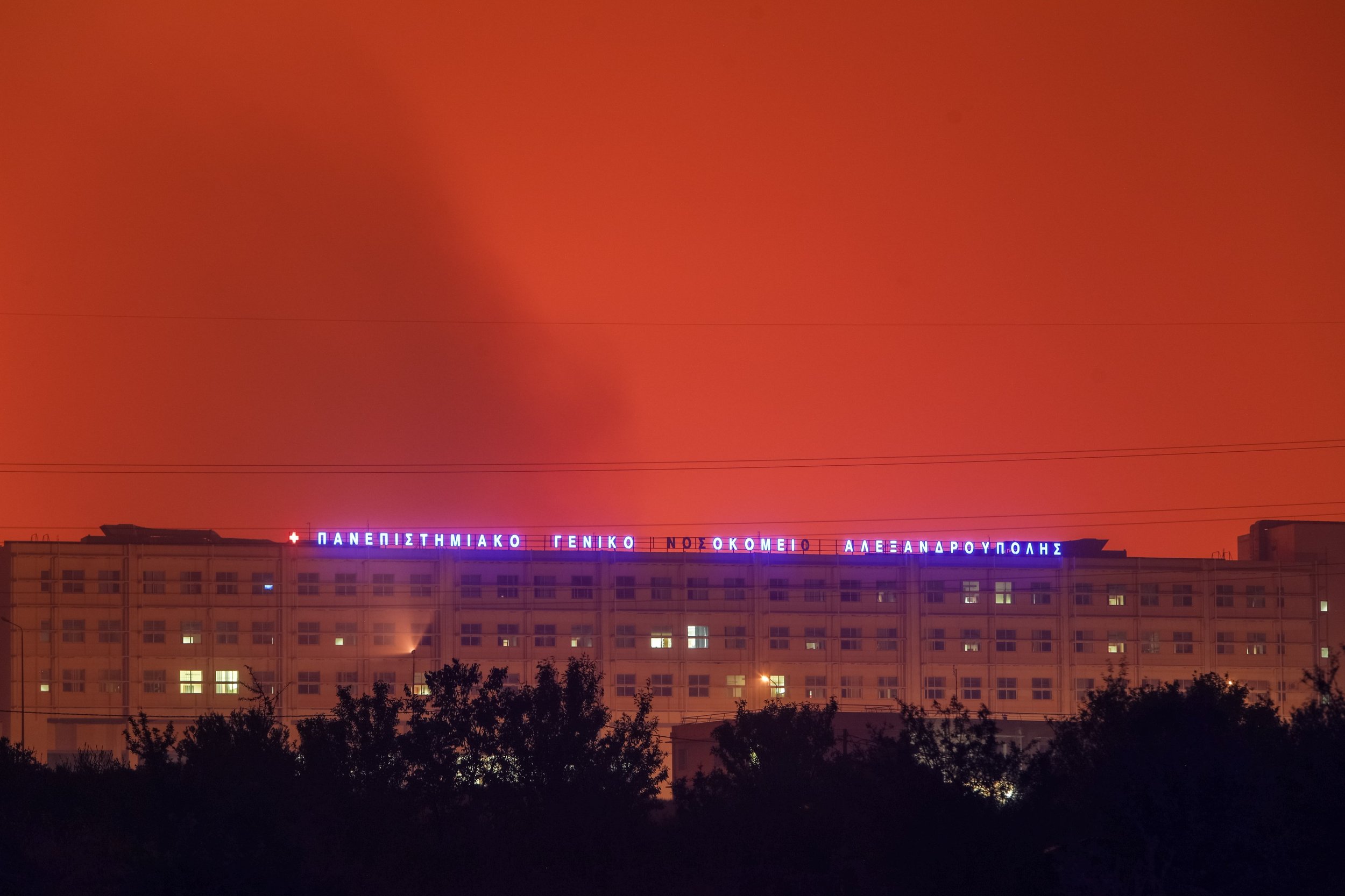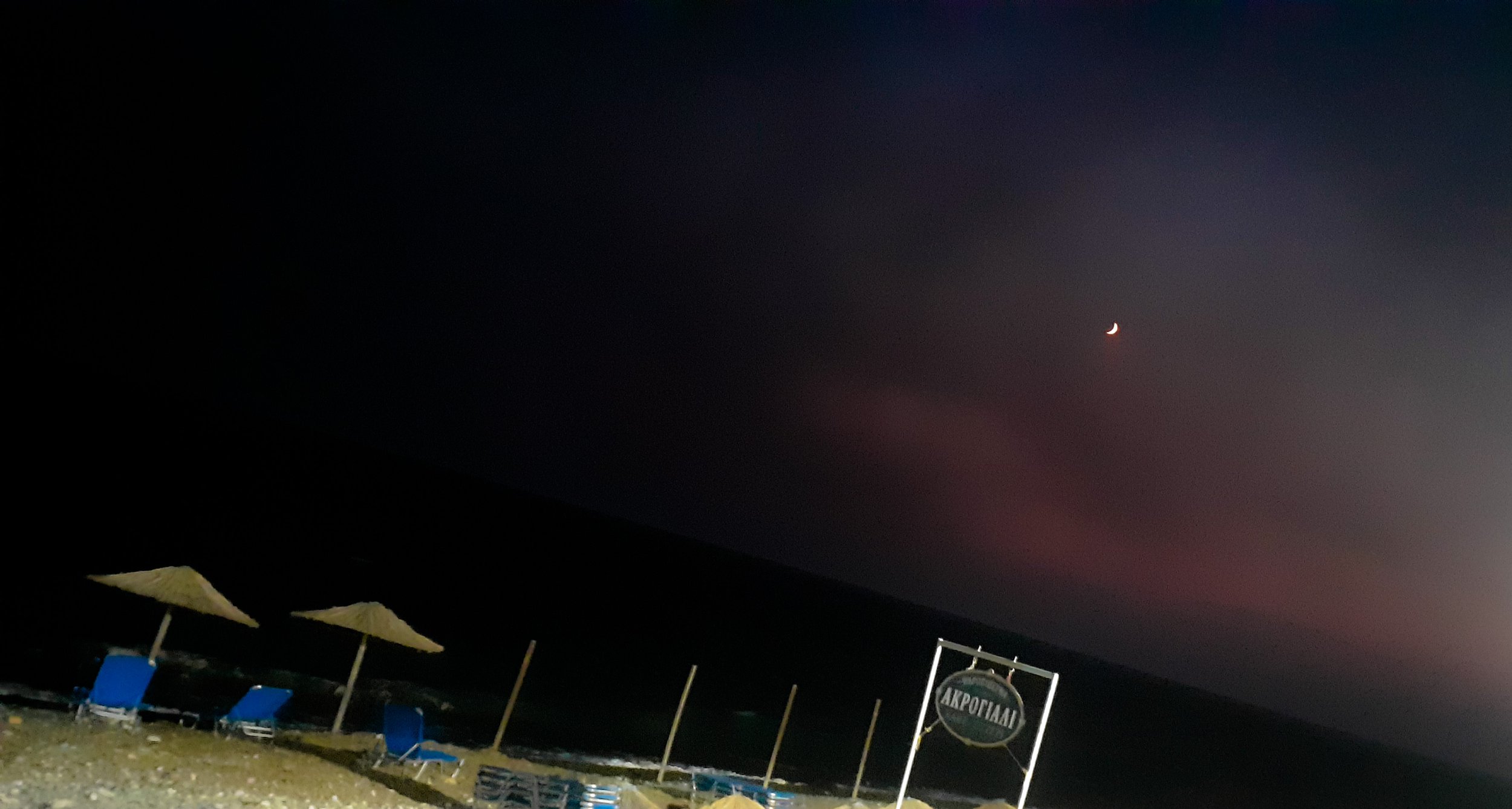“We either Burn or Flood”: Chasing the (Climate) Crisis throughout the Greek Summer, and Beyond
By Eleni Kotsira, PhD AFHEA, Senior Social Researcher, Alma Economics
Thick smoke from the blaze spreading across the East Macedonia and Thrace Region, Greece, as seen from the island of Samothráki, 19 August 2023. Photo by author.
I am writing this piece amidst the perfect September night on the island of Samothráki, NE Greece; breezy but not cold, with the stars shining bright and the constellations easy to work out, and a symphony of waves and crickets maintaining the beat of the night. The body numbs in peace and I appreciate the quietness. But the next rain is already coming, a so-called ‘cold lake’ forming off the shores of Italy and moving toward Greece, bringing more worry and insecurity to people whose properties already flooded or burnt earlier this summer.
Fires sparked across mainland and island Greece in July 2023, triggered among others by long-lasting, record-breaking heatwaves. Flames marched for days, devouring land, properties, flora and fauna, and, tragically, resulting in the loss of human life. Temperatures dropped in August, but summer winds, known as ‘etesian winds’ in the Mediterranean, got stronger. Then, on August 19th, after about a week of strong etesian winds in the Thracian Sea, I woke up to these words: ‘Alexandrúpolis is burning’.
The fire that started in the suburbs of the city of Alexandrúpolis, NE Greece blazed for three weeks and burnt an area of approximately 94,000 hectares across the East Macedonia and Thrace Region, including sections of a national park (Copernicus Emergency Management Service, 2023a). It is now acknowledged as “the largest [wildfire] in the EU since 2000, when the European Forest Fire Information System (EFFIS) began recording data” (European Civil Protection and Humanitarian Aid Operations, 2023). It is reported that twenty people lost their lives as a result of the fire.
As this fire was still burning, rainfall appeared in the forecast for most of mainland Greece in the early days of September, with hopes expressed that what the state could not do to wipe out the fire, the weather would. But the rain fell elsewhere and instead of putting out the fire, it flooded about 86,000 hectares across the Thessaly Region (Copernicus Emergency Management Service, 2023b), lying between Central and Northern Greece, impacting agriculture and livestock farming in the country’s biggest valley. Seventeen people are so far known to have perished as a result of these floods.
Such are the facts. But as facts find their way into life, they become harder to digest. Their rolling occurrence makes it harder to think, the smoke harder to breathe, and the muddy floodwaters harder to stand.
The University General Hospital of Alexandrúpolis engulfed by flames on the night of 21 August 2023. Photo taken from Twitter/X, @News247gr – VASILIS VERVERIDIS/ΜΟΤΙΟΝ ΤΕΑΜ/EUROKINISSI.
Back to those days in August, I would observe the smoke spread across the mainland of the East Macedonia and Thrace Region, crossing the sea, hanging over Samothráki, sometimes impacting air quality and visibility, sometimes even causing ashfall. Due to the density of the smoke, people would even be fooled into thinking that another fire had started on the island and already progressed to a destructive extent. The island would indeed soon face its own challenges, its own fires (thankfully of lesser magnitude), its own power cuts and subsequent three-day standstill in the midst of the tourist season (Kotsira, 2023). Somewhat used to hardship on Samothráki and aware of the strengths and weaknesses of the island since 2017 when it had its own disaster happening in the wake of an unexpected deluge (Kotsira, 2020), I reflected on the odd sense of safety an island can provide. We are used to perceiving islands as remote, cut off and vulnerable, the water surrounding them seen as a barrier (Nic Craith, 2020). And yet, in those dystopian August days, when the fire was spreading uncontrollably to every possible direction around Alexandrúpolis, the sea became a protection mechanism. That fire, no matter its march, would not reach us. But whatever environmental or human-induced hazard would come our way, it was largely on us, islanders and summer visitors, to handle.
Safety is a fragile concept that can burn or drown within moments. A summer of fires succeeded by an autumn of floods has contributed to people feeling, according to recent polls, “unprotected and abandoned… any sense of security that the state should offer has evaporated” (Maria Karaklioumi quoted in Smith, 2023). Welch-Devine et al. (2020) discuss how “microexperiences of change” shape individuals and communities understanding of and response to climate change as this is felt and sensed through their lived experience (1). In recent years, a phrase has become popular throughout Greece: ‘We either burn or flood’ (‘Η καιγόμαστε ή πνιγόμαστε). This phrase indicates how the microexperiences of change, as endured by different people, synthesize into a collective experience, a “shared understanding” (4). ‘We either burn or flood’ is both descriptive of one’s lived experience as well as a form of political commentary, criticizing the defective national disaster risk management plan. The phrase also hints at a deterministic vision of what the future holds.
The night sky above Samothráki turns red as a result of the fire in the mainland across, 20 August 2023. Photo by author.
An autumn and winter of rain unfold ahead… A rain that has already started falling. It is challenging to get rid of the ashes left behind by the fires and the mud brought by the floods. In their stubborn presence – in the corners and nooks of buildings, the soles underneath people’s shoes, the clothing and bedding endlessly looking dirty – they act as stimuli, reminders of recent disasters, at times unwelcome, inescapable and traumatic (American Psychiatric Association, 2013). Other than the remnants of each disaster, there are countless other moments and situations that can also facilitate stimuli. For example, after the flood on the island of Samothráki following the deluge in September 2017, the sound of running water – whether it was rain, a fountain, or even the tap – was enough to cause distress to several of the survivors. More and grimmer stimuli seem to be on the way in the later half of 2023. Regions that experienced extensive fires during the summer are now prone to flooding. Areas already substantially deluged in the first half of September are likely to have their soil saturated and, if so, are also prone to further flooding as land has reached its absorption capacity.
In light of all this, people do not have the option to forget, neither about the fires nor the floods. Instead, they look toward the future with fear of what it might bear or what it might prove to be. What can the next fire or the next flood signal if not an ‘environmental doom’ (Clayton et al., 2021: 71)? And if so, what is there left to do that can possibly have an impact? We will either burn or flood…
Fear or trauma can have a formative influence leading to action and, most critically, leading to change. Thus, such emotions are also a form of response to events spinning out of one’s sense of control. Because perhaps the most decisive motivation to act to mitigate climate change is to sense the ashes breathed in by one’s nostrils and choke, to find the mud stuck underneath one’s nails and feel the impulse to tear the flesh off – then climate change, in its global outreach and allegedly unseen acceleration, becomes tangible, real, local and personal.
“Widespread structural damage. Zero visibility. This is the point of collapse, the black hole. Yet there’s calm that only now feels as if it’s always been here. A pure, deep truth waiting to be unearthed like a fossilized bone. Here, in the centre, it is clear and still. It is up to you.”– excerpt from Rachael Mead’s poem Beaufort Scale for Depression (Howard et al., 2018: 28)
References
American Psychiatric Association (2013) Diagnostic and Statistical Manual of Mental Disorders. 5th ed. Arlington, VA: American Psychiatric Association.
Clayton, S., Manning, C. M., Speiser, M., & Hill, A. N. (2021) Mental Health and Our Changing Climate: Impacts, Inequities, Responses. Washington, D.C.: American Psychological Association, and ecoAmerica.
Copernicus Emergency Management Service (2023a) Wildfire in East Macedonia, Greece: EMSR686 - Situational reporting. [Online]. Available from: https://rapidmapping.emergency.copernicus.eu/EMSR686/reporting
Copernicus Emergency Management Service (2023b) Flood in Greece: EMSR692 - Situational reporting. [Online]. Available from: https://rapidmapping.emergency.copernicus.eu/EMSR692/reporting
European Civil Protection and Humanitarian Aid Operations (2023) Helping Greece tackle the largest wildfires of the century in Europe. [Online]. Available from: https://civil-protection-humanitarian-aid.ec.europa.eu/news-stories/stories/helping-greece-tackle-largest-wildfires-century-europe_en
Kotsira, E. (2020) “The Vanishing Land: In Search of a Myth for Samothraki”. Engagement – American Anthropological Association Environmental Anthropology Blog (Thematic Series: The Event, the Horizon). [Online]. 12 May. Available at: https://aesengagement.wordpress.com/2020/05/12/the-vanishing-land-in-search-of-a-myth-for-samothraki/
Kotsira, E. (2023) The desert island of Samothraki. 24 August. Poetic Movements. [Online]. Available from: https://poetic-movements.blogspot.com/2023/08/the-desert-island-of-samothraki.html
Mead, R. (2018) Beaufort Scale for Depression. In: Howard, M., Moore, F. & Pun, E. eds. Magma Poetry. 72 (The Climate Change Issue), p. 28.
Nic Craith, M. (2020) The Vanishing World of The Islandman: Narrative and Nostalgia. Cham: Palgrave Macmillan.
Smith, H. (2023) ‘People feel unprotected’: Greeks lose faith in state after Storm Daniel and a summer of wildfires. The Guardian. [Online]. 16 September. Available from: https://www.theguardian.com/world/2023/sep/16/greece-failed-state-storm-daniel-wildfires-libya-cyclone
Welch-Devine, M., Sourdril, A. & Burke, B. J. eds. (2020) Changing Climate, Changing Worlds: Local Knowledge and the Challenges of Social and Ecological Change. Cham: Springer.



